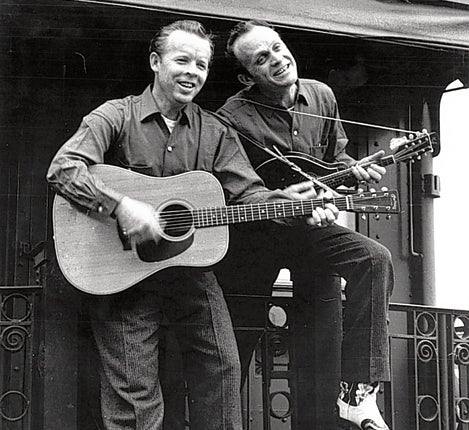Charlie Louvin: One half of the celebrated country music duo the Louvin Brothers

Almost unchallenged, the Louvin Brothers were the greatest brother act in country music and several of their songs, "When I Stop Dreaming", "The Christian Life" and "Cash on the Barrelhead", have been recorded by contemporary acts. "Being brothers really helped our harmonies," Charlie Louvin told me on a UK tour in 1988, "but I doubt if you could think of one brother act that grew old together. It just don't work."
The Louvin brothers were born and raised in the Appalachian Mountains in Alabama. Colonel and Georgiane Loudermilk had seven children, with Ira being born in April 1924 and Charlie arriving in July 1927.
Through singing in church, Ira and Charlie knew that they sounded good together and Charlie learnt to play the guitar when he was 16. With Charlie on guitar and Ira on mandolin, they developed the "high lonesome" sound associated with earlier groups from the area, the Blue Sky Boys and the Delmore Brothers. Charlie, with a fine tenor voice, usually sang melody while Ira added an astonishingly high harmony.
In 1947, they became the Louvin Brothers for programmes on WROL in Knoxville. After abortive record sessions for Apollo, Decca and MGM, they moved to Capitol in 1952. The producer, Ken Nelson, already had a country duo (Jim and Jesse) and so he wanted the Louvins to concentrate on gospel. The brothers auditioned for the Grand Ole Opry, but were turned down because they sang gospel. As they were told, "You can't sell tobacco with gospel music." "We knew we had to change," said Charlie, "or we'd always be sucking the back tit."
"When I Stop Dreaming", inspired by life on their parents' farm, was a major country hit in 1955. They topped the US country chart with "I Don't Believe You've Met My Baby" (1956) and followed it with the jailhouse song "Cash on the Barrelhead". As well as writing their own songs, they updated traditional favourites such as "In the Pines" and "Knoxville Girl".
The Louvins toured on country shows in the South and were on the same bill as Elvis Presley. "The show starred the Louvin Brothers and Elvis was one of the '...and many others'," recalled Charlie. "The first week, he opened the show but after the second week, he was becoming a phenomenon as he was on the Dorsey Brothers' TV show. From that point, nobody could follow him – we did good to even finish our act!"
The Louvin Brothers recorded prolifically for Capitol, including the albums Tragic Songs of Life (1956), My Baby's Gone (1958), Satan Is Real (1960) and Weapon of Prayer (1961), which included "The Great Atomic Power", later recorded by Elvis Costello. "You have to be from the Deep South to understand Weapon of Prayer as I don't think England is real high on religion," said Charlie. "People go to church because it is the thing to do, but in the Deep South, it is a way of life. They believe that no matter how mean you are, if enough people pray for you, you're going to start being good. Weapon of Prayer is about that."
In 1958, Nelson told Ira that the mandolin was hindering the sales of the Louvin Brothers' music and he had to play guitar. Ira was disillusioned and he never again played mandolin on record. The album Satan Is Real contained a kitsch cover of the brothers in hellfire, which wasn't far from the truth. Charlie thought that Ira's drinking was ruining their act. They split in August 1963.
Their final country hit was prophetically titled, "Must You Throw Dirt in My Face" (1962), and both of them set about a solo career. Ira sang with his fourth wife, but both were killed in a car crash in 1965.
Charlie, a far more stable character, had country hits with "I Don't Love You Anymore" (1964), "See the Big Man Cry" (1965) and several other titles. He appeared in the 1966 films Music City USA and The Golden Guitar.
The Byrds recorded "The Christian Life" on their country album Sweetheart of the Rodeo (1968), and Emmylou Harris sang "If I Could Only Win Your Love" and, with Don Everly, "Everytime You Leave". A tribute album to the Louvins, Livin' Lovin' Losin', won a Grammy in 2004. Charlie continued to tour and record to the end: his final album, Back When We Were Young, was released a few months ago.
Charlie Elzer Loudermilk (Charlie Louvin), singer and songwriter: born Section, Alabama 7 July 1927; married (3 sons); died Wartrace, Tennessee 26 January 2011.
Subscribe to Independent Premium to bookmark this article
Want to bookmark your favourite articles and stories to read or reference later? Start your Independent Premium subscription today.

Join our commenting forum
Join thought-provoking conversations, follow other Independent readers and see their replies